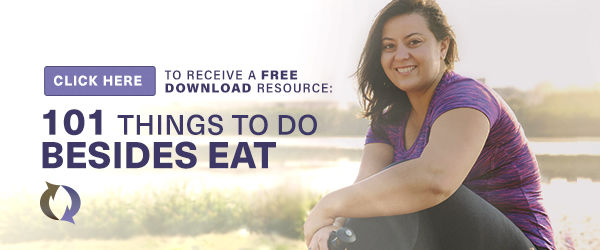Although you may feel alone, many people share common eating challenges.
Here are a few of the common eating challenges we encounter in the people we work with.
4 of your most common eating challenges
1. When you are under stress, you reach for food.
One of the most common challenges is eating when you’re stressed.
 It’s helpful to remember that using food to feel better when you are under stress is one way that you’ve learned to take care of yourself. (Read Stress Management 101.)
It’s helpful to remember that using food to feel better when you are under stress is one way that you’ve learned to take care of yourself. (Read Stress Management 101.)
And it might work… temporarily. The source of the stress will still be there when you are done eating.
This can become a vicious cycle: Stress > Eat > Stress > Eat. (Have you been there?)
The challenge? You can’t easily resolve a problem you’ve spent years practicing! Many people who struggle with “stress eating” have “invisible walls” that keep them stuck following the same patterns over and over. (Learn more about your invisible walls.)
It’s only when we gain new insights, wisdom, and guidance from those who have been there before, that we get a fresh perspective and a new approach to transforming our old habits.
2. You struggle when there is a lot of food around.
We live in an abundant food environment! We are constantly faced with opportunities to eat. Whether there are snacks in the break room, candy at the check-out counter, leftovers in the fridge, or restaurant delivery apps on your phone, you may find yourself frequently having to make decisions about eating.
If you are “food suggestible,” meaning you want to eat when see other people eating or you see or smell delicious foods, even on a commercial or magazine ad, there are a mine field of triggers for eating. You may feel that you use up your willpower saying “no” to these opportunities throughout the day, and eventually give in.
Pausing to notice whether you are hungry or not is an important step to recognizing whether they desire to eat came from the sight of food, from your body’s need for food, or from some other trigger.
So, start by asking “Am I hungry?” when you feel like eating. Look for physical symptoms that your fuel level is getting low. If there are no symptoms of hunger, now you have an opportunity to understand more about why you feel like eating.
3. You often eat for emotional reasons.
Everyone eats for emotional reasons! When eating is your primary coping skill, it limits your ability to meet your emotional needs.
Think about it this way. Just as hunger signals your need for fuel, emotions often signal your other needs, such as your need for comfort, peace, rest, pleasure, and so on.
Food doesn’t meet those needs very well or for very long, so the desire to eat returns again and again.
Learning to recognize and meet your emotional needs gives you many more options for feeling better. And these are skills that can be learned!
4. Mindful eating makes sense, but you’re having difficulty applying it consistently.
Most people are finally realizing that diets just don’t work for long term change. So perhaps you’ve heard about mindful eating and the concepts make sense, but you aren’t quite sure how it can help you. Or maybe you’re having difficulty consistently applying the concepts.
The problem is that mindful eating can feel like a bunch of vague concepts until you truly experience them in action. The good news is that our Mindful Eating Cycle is a practical tool that provides the necessary structure for resolving the eating challenges you face.
Using our approach to practice mindful eating is very different from simply reading about it.
To be clear, unlike many of the articles you’ll find online about mindful eating, Am I Hungry? programs are not simply about savoring food. In fact, it is not even about “eating when you’re hungry and stopping when you’re full.”
We use mindfulness to explore your entire “decision making” process with food. (I put “decision-making” in quotes because without mindfulness, you are not even making conscious decisions—you are repeating old patterns.)
Our mindful eating processes help you learn how to recognize your triggers for mindless and emotional eating AND find replacements that work better.
There are solutions to the common eating challenges that keep you stuck!
If you are like most people we’ve had the privilege of working with over the years, you’ve tried many diets, programs, “healthy lifestyle plans,” – or maybe you’ve finally given up.
No wonder it may be difficult to fathom how powerful Am I Hungry? is for healing your relationship with food!
I’m no miracle worker, but what I know is that our Mindful Eating Cycle process works! You will learn an entirely new way of relating to food that doesn’t involve any counting, measuring, logging, or punitive exercise.
I’ve watched thousands of people discover peace and even joy with food so far and I believe that you can be next!
End your eating challenges now!
I am passionate about this work because I can relate to the eating challenges you struggle with. Not only did I have my own struggle with food and body image, but I’ve spent more that 20 years working with many others with similar challenges.
You are not alone! If you are done with the frustration of trying one eating plan after the next and really want to heal your relationship with food, you owe it to yourself to check out all of our options for learning about mindful eating!
Choose an option that feels right for you and begin your journey to:
- Break free of the bondage of chronic dieting, weight cycling, and/or overeating.
- Learn new ways to think, feel, and act around food.
- Free up your energy to focus on building the vibrant life you crave. life.
This article has been updated from a previously published version.
Enjoyed this article? Here are three more to help you:
Are old beliefs causing cravings or overeating?
I’m Bored. I Want To Eat! Overeating Trigger #2: Boredom
I’m full but I still want to keep eating more food!

